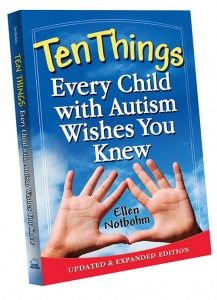
Excerpted from Ten Things Every Child with Autism Wishes You Knew, updated and expanded edition, © Ellen Notbohm
(2012, Future Horizons),
chapter eight, “Help me with social interactions.”
We can be blunt with each other here. Kids with autism or Asperger’s frequently stand out as social oddballs. The heartbreak it causes, to the child and to the parent, stirs in many parents an intense need to fix that facet of their child. If social competence was a physiological function, we could throw medication, nutrition, exercise or physical therapy at it and make it happen. If kids with autism were curious, outgoing, motivated learners, we could cultivate social intelligence curriculum-style.
Too often, our kids aren’t like that, and social awareness isn’t a set of concrete, itemized skills. Basic manners (please and thank you, use tissue, wait your turn) can and should be taught, regardless of the child’s level of function, but learning to be at ease among others in the bustle and nuances of daily life is infinitely more complex. Social skills are the end product of an intricate organism of developmental elements we call “social thinking.”
Just as we all have to learn to walk before we run, we must teach our children to “think social” before they can act social, with understanding and positive intent, not just by rote repetition or in fear of consequences. Social thinking presents your child with the challenge of factoring context and perspective into his actions–to consider the physical, social and temporal aspects of his surroundings, to take into account the thoughts and viewpoints of others, to use shared imagination to connect with a play partner, and to comprehend that others have favorable or not-so-favorable thoughts and reactions to him based on what he says and does. Social thinking is the source from which our social behaviors spring, and this social-emotional intelligence may be a bigger determinant in a child’s long-term success in life than cognitive intelligence.
Teaching a child with autism to think social begins with chucking any assumptions you may harbor about his ability to absorb social sensibility by simply being around and observing socially adept people, or that he will somehow, someday outgrow his social cluelessness. To date, our education system has based curriculum standards on the flawed supposition that all children enter the world with an intact social processing brain and on a presumed social developmental progression. It makes no sense (and is grossly unfair to the child) to respond to a child’s social snafus based on such assumptions, and then blame his autism when our attempts to teach don’t register with him. What our children need is for us to shift perspective and start building their social awareness at its roots.
When we say we want our child to learn social skills, we’re really reaching for something grander. We want him to be able to fit into the world around him, to function independently at school, in the community, at work and within his personal relationships. More than playing by a rule book, being social is a state of confident being that grows with careful nurturing of social thinking skills, starting when a child is very young:
- Perspective: being able to see and experience the world from standpoints other than your own, and to see these different perspectives as opportunities to learn and grow.
- Flexibility: being able to roll with unforeseen changes in routine and expectation, being able to recognize that mistakes are not an end result but part of learning and growing, and that disappointments are matters of degree.
- Curiosity: drawing motivation from thinking about the “why” behind things – why something exists, why its existence is important, why others feel the way they do, and how it reflects back and matters to us.
- Self-esteem: believing enough in your own abilities to risk trying new things, having enough respect and affection for yourself to be able to deflect the cruel and thoughtless remarks and actions of others as saying more about them than you.
- Big picture thinking: appreciating that social thinking and social awareness are part of all we do, whether or not we are interacting with others. We read stories, trying to figure out the motives of characters and predict what they will do next. We replay situations in our head, deciding whether or not we acted appropriately. Your child may tell you, “I don’t care about being social; I’m happy by myself.” He may mean it in the moment, and many people do generally prefer solitude to socializing. But it’s also true that some of our kids adopt the I-don’t-care attitude to deflect the pain of caring very much and not having the knowledge, skills and support to overcome their social barriers, and in doing so, be able to achieve their goals and dreams in life.
- Communication: understanding that we communicate even when we are not talking. Michelle Garcia Winner, who coined the term “Social Thinking” and is considered today to be one of the leading voices in the field, outlines four steps of communication that unfold in linear sequence, within milliseconds and often without conscious thought:
- We think about other people’s thoughts and feelings as well as our own
- We establish physical presence so people understand our intention to communicate
- We use our eyes to monitor how people are feeling, acting, and reacting to what is happening between us
- We use language to relate to others
Did you notice that language enters the communication equation only as the last step?
[sws_blockquote align=”” alignment=”alignleft” cite=”” quotestyles=”style02″] “Creating a strong feeling of connection with each student, resulting in an overall sense of community where the needs of each person – children, teachers, parents and volunteers alike – are equally valued, is a primary goal. In order to achieve this, we focus on developing effective social skills and nurturing emotional intelligence – what we call being “people-smart” and “self-smart.” The focus is on cooperation not competition. When children are made to feel different, or ‘less than’ their peers because of their grades or behavior, they are less likely to make strong connections with other students or their teachers. Their own sense of self is diminished, which robs them of their true potential. Conversely, a cooperative, connected community is fertile soil for learning.” – Cindy Carlson, founder of Rose Scott School, an alternative K-12 school in Chico, California, for creative thinkers and kinesthetic learners.
[/sws_blockquote]
And yet it’s where, as parents and teachers, we typically place emphasis. Teaching only step four in the absence of the other three leaves your child or student inadequately equipped, vulnerable and wide open to the likelihood that she will be less effective, less successful in her social communication.
Mainstreaming a child with her typically-developing peers will not bring forth social thinking skills without direct, concrete teaching of social concepts. Without this direct teaching, your child will still bob along into adulthood in that same sea of social miscommunication. Teaching your child to think social and be social is a mosaic of thousands upon thousands of petite learning opportunities and encounters that, properly channeled, will coalesce into a core of self-confidence. It requires you, as her parent, her teacher, and her guide, to be socially aware 110% of the time, break down the web of social intricacies, and clue her into the social nuances that are so difficult for her to perceive.
“To the top of the mountain, one step at a time,” advises an old proverb. One of my son Connor’s favorite books told the story of Sir Edmund Hillary and his Sherpa guide Tenzing Norgay, the first people to reach the summit of Mt. Everest. Amid controversy over the years that Tenzing arrived at the summit a step or two ahead of the more famous Sir Edmund Hillary, Tenzing’s son Jamling told Forbes magazine in 2001: “I did ask him, and he said, ‘You know, it’s not important, Jamling. We climbed as a team.’” Like Tenzing, you’ve been climbing this mountain for many years. Like Hillary, your child is making his first ascent. Be his Sherpa, knowing and helping him see that the view along the way can be spectacular.
Reference: Garcia Winner, M. 2007. Thinking About YOU Thinking About ME, 2nd ed. San Jose, CA: Think Social/Social Thinking.
[sws_blue_box box_size=”580″]Special Events for Autism Month in the Upper North State
- April 5: Sensory Cinema Saturday, Redding. Remi Vista’s first “Sensory Cinema” event is a unique opportunity for families who have a child with autism (or other special needs) to attend a fun, family-friendly movie without sitting through previews or concern for traditional rules of movie viewing. Participants are welcome to get up and dance, sing and celebrate! Seating is limited, buy tickets ahead by calling (530) 245-5805 ext. 205, or buy at the event at 10 a.m. Movie starts 10:15 a.m. $4/person. Hosted by Cinemark Theatres, 980 Old Alturas Rd.
- April 10: Author presentation & book signing, Chico. Meet Butte County parent and special education teacher Joan Goodreau, author of Strangers Together: How My Son’s Autism Changed My Life. Learn how she moved from a perspective of “why us” alienation to acceptance as she discovered that no one can raise a child with Autism Spectrum Disorder alone. Professionals will learn what it is like to raise a child with a disability and parents will relate to her real-life stories. Held 7 p.m. at Lyon Books and Learning Center, 35 Main St. Goodreau will also sign books at The Autism Fair and Chico Walks for Autism.
- April 12: Come to Your Scent-ses day, Palo Cedro. Remi Vista invites parents and their autistic or special needs children to Triple Creek Ranch Therapeutic Riding Center for an incredible day of adventure, fun and friendship! Activities include fun sensory stations; face painting, leather stamping, horse grooming & painting (yes, you get to paint a horse!), an equine therapy horse demo, therapy horse rides, mural painting, barbecue and barn dance with live fiddlers. Meet with organizations that provide services to children with autism and other special needs. 10a.m.-3p.m. $10/family suggested donation. The ranch is located at 10215 Oriole Lane. (530) 245-5805 ext. 205.
- April 19: Autism Awareness Fair, Chico. Bring your family to enjoy games, a bounce house, face painting and music, to learn about autism resources, and much more. The fair is a collaboration of Autism Lifespan, Little Red Hen, and Far Northern Regional Center. 10a.m-2p.m. Held at Rose Scott Elementary School, 850 Palmetto Ave. (530) 897-0900.
- April 19: Sens-O-Spring Bunny Bounce event, Palo Cedro. Remi Vista presents an exciting family-friendly event to capture the entire spectrum of senses for parents and their autistic or special needs kids. Fun and exciting activities for children include: bunny costume & Easter basket creation stations (1p.m.), Easter egg hunt (3p.m.), bounce houses, bubble extravaganza, and flower-pot painting. Parents can meet behavior specialists and learn creative ways to manage difficult behaviors, and get resource information. Vendors showcase their autism-related expertise. 1-5p.m. $10/family suggested donation. Held at 8331 Deschutes Rd. (follow the signs). (530) 245-5805 ext. 205.
- April 26: Chico Walks for Autism. Come show your support to local families living with autism by walking in this fun third annual event that includes sensory activities for children, a vendor fair and food trucks. Starts at the One Mile Recreation area of beautiful Bidwell Park in Chico. Starts 9 a.m. $10/adult, $5/child. (530) 518-2495.
- April 26: A Day at the Farm, Anderson. Visit Hawes Historic Farms for an evening of fun activities for the entire family. This final April Remi Vista event is designed for parents and their autistic or special needs kids. Activities include zip-line, campfire, cow train, bounce pillow, volleyball, horseshoes, and more. Outdoor movie with campfire & s’mores. A variety of vendors will be on site showcasing their autism related expertise. 4-9 p.m. $10 suggested donation per family. 21923 Dersch Rd. (530) 245-5805 ext. 205.
- Weekdays in April: Autism Information. During April, Guided Spectrum, a Chico-based therapy and consulting organization specializing in Autism Spectrum Disorders, offers free consultations to any community member wanting to learn more about autism; free on-site trainings for staff of professional organizations; and invites families to learn more about their program. Call to schedule. Located at 40 Constitution Dr., Ste F. (530) 588-4539.
[/sws_blue_box]
Comment Policy: All viewpoints are welcome, but comments should remain relevant. Personal attacks, profanity, and aggressive behavior are not allowed. No spam, advertising, or promoting of products/services. Please, only use your real name and limit the amount of links submitted in your comment.
Comments
Leave a Reply
You Might Also Like...
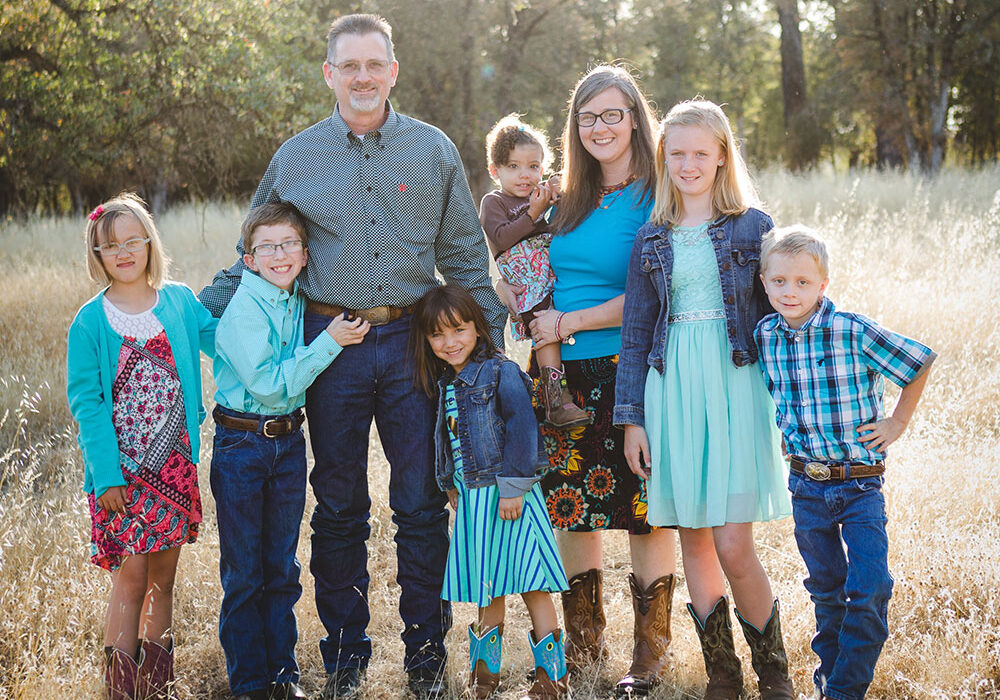
Foster Care and Adoption – A Family in the Making
With over 400,000 American children in foster care, and nearly 120,000 waiting for adoption, it is clear that families are waiting to be made. November is National Adoption Awareness Month, […]
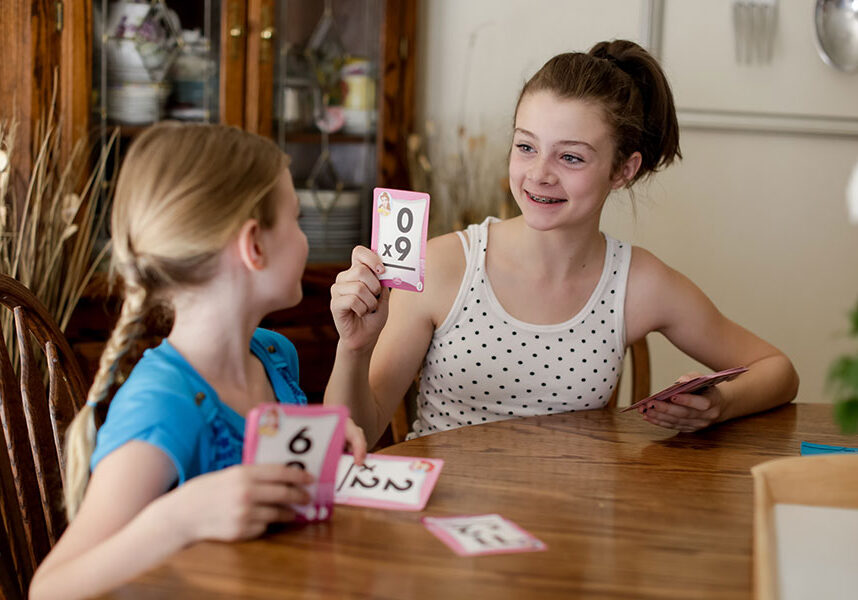
25 Ways to Help Your Child Do Better in Math
Get a jumpstart on the new school year by thinking about ways to help your child incorporate math skills into their daily lives. These tips will help build a positive […]

Weeding Out The Couch Potatoes – 50 Things To Do Instead Of Screen Time
Across the nation, crops of couch potatoes sprout up every winter. They are fueled by the colder days and early sunset, leaving them unable to do more than is absolutely […]


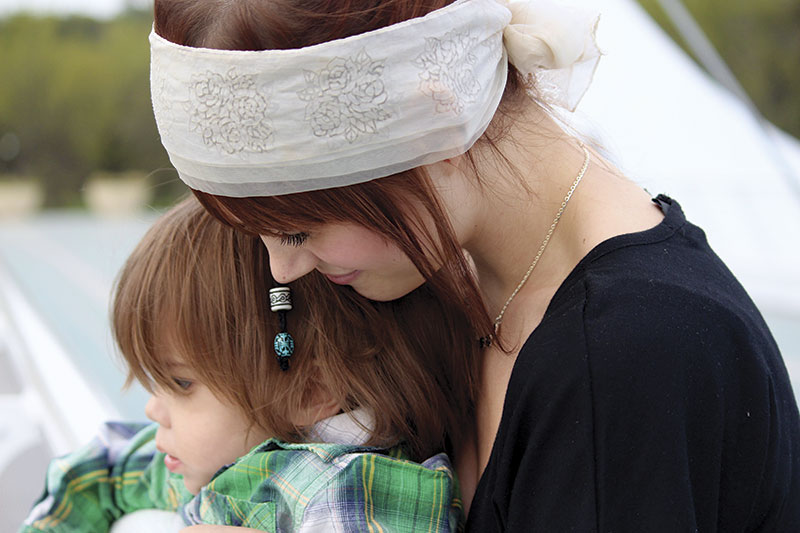
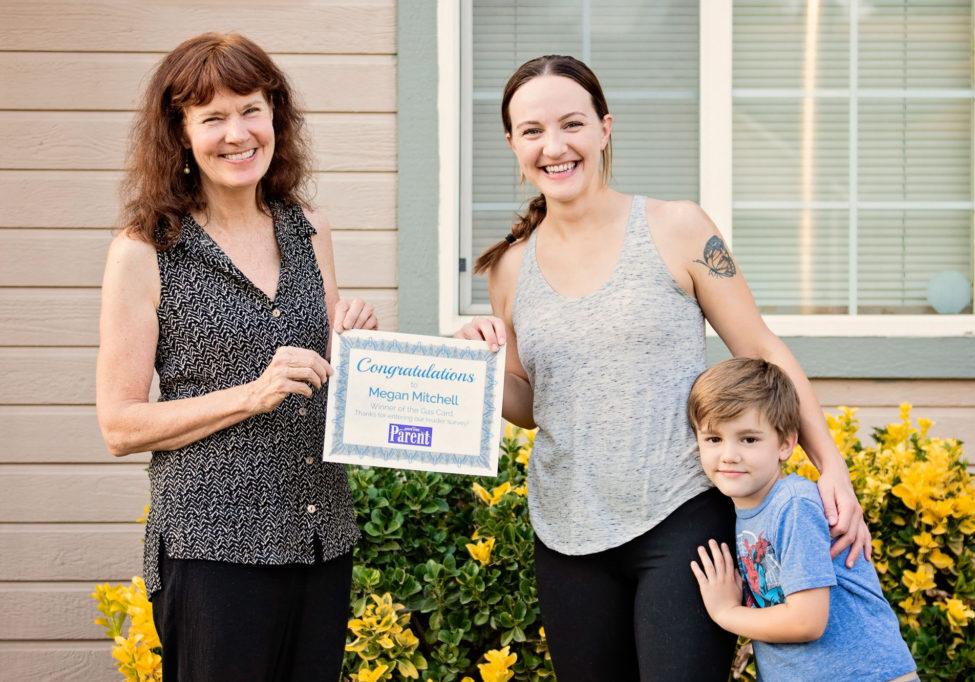
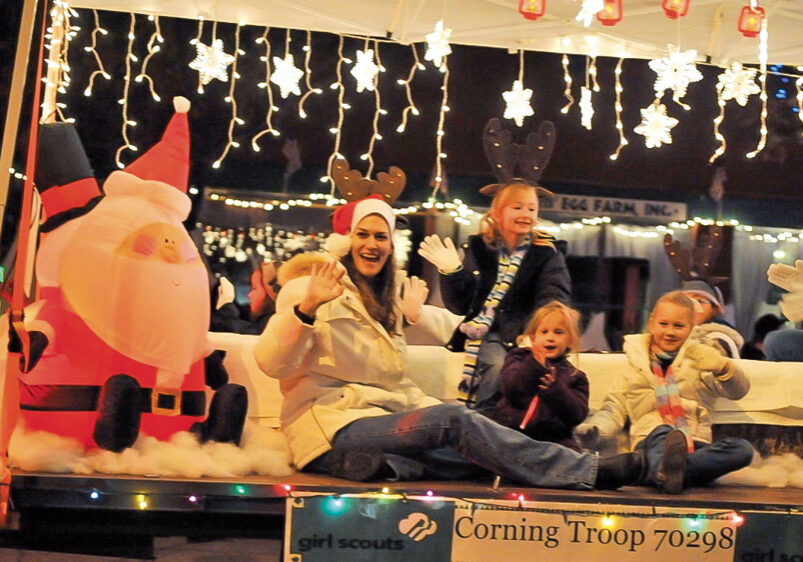
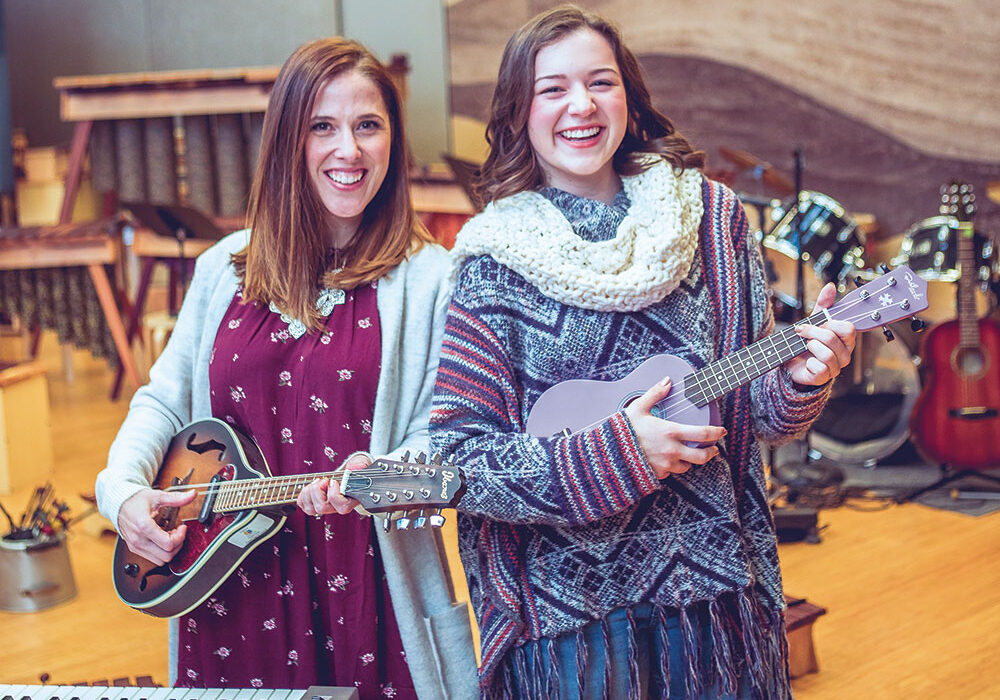
Regina says
My son was just diagnosed with autisum after 12 yrs of his life already and all I can do is try to catch him up best I can in his social life. I need to start some counseling for him.